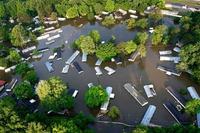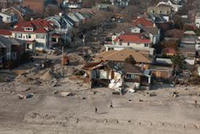-
Sediment carried by 2011 Mississippi flood shored up Louisiana’s wetlands

The spring 2011 flood on the Mississippi was among the largest floods ever, the river swelling over its banks and wreaking destruction in the surrounding areas. A new study also shows, however, that the floods reaped environmental benefits — transporting and laying down new sediment in portions of the Delta — that may help maintain the area’s wetlands.
-
-
Obama to issue cybersecurity executive order today
President Barack Obama is expected to issue an executive order tomorrow to dealing protecting U.S. critical infrastructure from cyberattacks. The order will be issues one day after the president’s State of the Union address. The order will establish a critical infrastructure council which will be run by DHS and will include members of the Departments of Defense, Justice, and Commerce as well as the National Intelligence Office. The council will be tasked with formulating new regulations for federal agencies, or broadening regulations already in place. The regulations will most likely include the sharing of data between private corporations and the federal government.
-
-
Infrastructure sees drop in funding last year
Infrastructure investments in roads, bridges, and power stations have dropped significantly in 2012 as banks struggled to offer long-term debt and governments targeted cost savings. There were hopes that infrastructure spending would boost the world economy in 2012, but funding fell from $159 billion worldwide in 2011 to $99 billion.
-
-
Northeast U.S. digs out after deadly snowstorm

About 250,000 homes and businesses in northeast United States remain remained without power this morning as a blizzard dumped more than three feet of snow on north-mid-Atlantic and New England states, and parts of Canada. The death toll was at fifteen. Utilities in New England said the storm could leave some customers in the dark at least until Tuesday. About 650,000 lost power in eight states at the height of the storm.
-
-
Tiny organisms in oceans can save islands from rising sea levels: study

Warming climate is causing sea levels to rise, posing a special threat to low-lying island nations. The government of the Maldive Islands, an island nation in the Indian Ocean consisting of a chain of twenty-six atolls, has begun exploring the possibility of purchasing land in Africa to relocate the entire population – about 330,000 – once rising sea water begin to swallow the small atolls. Scientists found out, though, that the warming temperature of the seas is causing tiny single-cell organisms to are spreading rapidly through the world’s oceans, where they just might be able to mitigate the consequences of climate change.
-
-
New internally cured concrete increases bridge life span
Concrete is normally made by mixing portland cement with water, sand, and stone. In the curing or hardening process, water helps the concrete mixture gain strength by reacting with the cement. Traditionally, curing is promoted by adding water on top of the bridge deck surface. The new technology for internal curing provides additional water pockets inside the concrete, enhancing the reaction between the cement and water, which adds to strength and durability. This new technology is enabling Indiana to improve bridges in the state with a new “internally cured” high-performance concrete.
-
-
NY to buy, demolish beachfront homes, make way for storm buffers

New York governor Andrew Cuomo plans to use $400 million in federal funding to buy beachfront homes as part of a broader plan to reshape the New York coastline so the state is better prepared for sea level rise, surges, and storms. The plan is to raze the purchased homes and leave to shore front vacant. Some properties would be turned into dunes, wetlands, or other natural buffers. Other parcels could be combined and turned into public parkland.
-
-
Miles tax may soon replace gas tax as a way to fund infrastructure maintenance
With infrastructure around the country in a state of disrepair, many states and lawmakers are trying to find a way to fund improvement of roads and bridges. The federal gasoline tax brings in fewer dollars each year, and now some lawmakers and transportation experts are considering the idea of taxing citizens by how far they drive each year instead of the amount of gasoline they buy each year.
-
-
Springfield, Illinois, faces infrastructure woes
As is the case with other cities, the infrastructure of Illinois’ capital, Springfield, is decaying. Experts told the city council that it would take $86.6 million over the next three years to shore up the city’s streets and sewer system, and $22.5 million a year thereafter to maintain it. The city is now grappling with how to raise the necessary funds.
-
-
Climate change threatens public health, safety, economy along U.S. coasts
A new technical study from the U.S. National Oceanic and Atmospheric Agency (NOAA) and the U.S. Geological Survey (USGS) reports that the effects of climate change will continue to threaten the health and vitality of U.S. coastal communities’ social, economic, and natural systems. All U.S. coasts are highly vulnerable to the effects of climate change such as sea-level rise, erosion, storms, and flooding, especially in the more populated low-lying parts of the U.S. coast along the Gulf of Mexico, Mid-Atlantic, northern Alaska, Hawaii, and island territories. The report says that the financial risks associated with both private and public hazard insurance are expected to increase dramatically.
-
-
Osaka Basin quake map identifies high-rise buildings at risk

The Osaka Basin, Japan is home to many high-rise buildings which sit atop its thick soft sediments, vulnerable to long-period strong ground motions that last minutes. A new map created by Japanese researchers is intends to guide engineers and city planners in new construction and identifies existing buildings with the potential of resonance vibration.
-
-
New bridge construction technologies to shore up U.S. infrastructure
Experts agree that there is an urgent need to construct and repair bridges across the United States. Around 70,000 bridges in the country are considered “structurally deficient” by government standards. New technology could help the United States manage its growing, and aging, infrastructure without breaking the bank or levying high taxes on citizens.
-
-
Extreme rainfall linked to global warming
A worldwide review of global rainfall data has found that the intensity of the most extreme rainfall events is increasing across the globe as temperatures rise. In the most comprehensive review of changes to extreme rainfall ever undertaken, researchers evaluated the association between extreme rainfall and atmospheric temperatures at more than 8,000 weather gauging stations around the world.
-
-
Pentagon to bolster U.S cyberwar capabilities
The Department of Defense is planning an expansion of the U.S. Cyber Command, and the Pentagon plans on recruiting thousands of code crackers, online security professionals, and hackers in order to assemble the nation’s largest cyber army ever.
-
-
Maryland counties debate funding stormwater drainage management
A new tax aimed at property owners could finance the first set of improvements of the drainage works in Salisbury, Maryland since the original system was laid almost a century ago. City leaders have been arguing since 2009 over dedicating a source of funding to stormwater management, when an environmental panel recommended it. In the past, funding for projects like this has been hard to find as other priorities were deemed more important.
-
More headlines
The long view
Falling Space Debris: How High Is the Risk I'll Get Hit?
An International Space Station battery fell back to Earth and, luckily, splashed down harmlessly in the Atlantic. Should we have worried? Space debris reenters our atmosphere every week.
Using Drone Swarms to Fight Forest Fires
Forest fires are becoming increasingly catastrophic across the world, accelerated by climate change. Researchers are using multiple swarms of drones to tackle natural disasters like forest fires.
